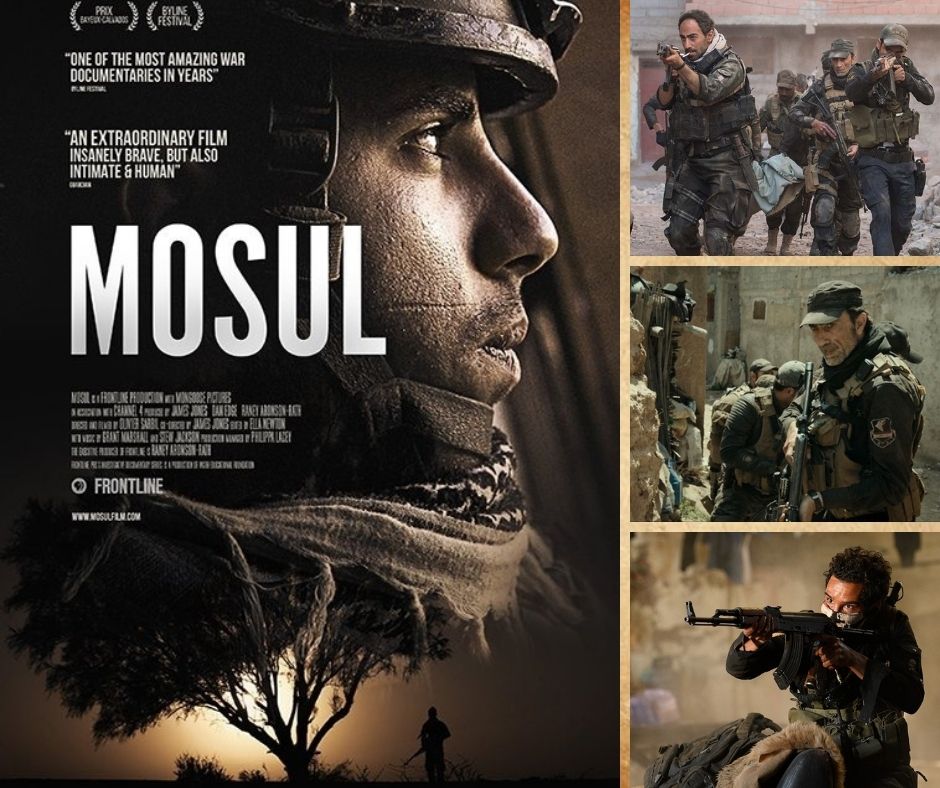Mosul (2019)
Director: Matthew Michael Carnahan
Starring: Adam Bessa, Suhail Dabbach, Iskander J. Kharbouch, Ahmad El Wakil, Waleed Zuaiter
Genre: War, Action, Drama
Runtime: 101 minutes
Language: Arabic, English (with subtitles)

Plot Overview:
Set during the fierce battle for Mosul, Mosul (2019) offers a visceral and gritty portrayal of the conflict between the Iraqi forces and ISIS militants. Directed by Matthew Michael Carnahan, the film takes a ground-level view of war, focusing on a small group of Iraqi soldiers and their relentless drive to reclaim their city, all while navigating the brutal realities of war and the complex emotional toll it takes.
The film opens with a devastating siege of Mosul, Iraq, as the city is caught in the grip of ISIS occupation. The story follows a squad of elite Iraqi Counter-Terrorism Service (CTS) soldiers, led by Captain Kawa (played by Adam Bessa). These men, hardened by the brutality of war, have been tasked with liberating the city from ISIS forces. However, their mission isn’t just military—it is deeply personal, as many of them have lost loved ones and seen their homes destroyed by the enemy.
The group is introduced to a young recruit, Theo (played by Iskander J. Kharbouch), who was previously a police officer before the fall of the city. As Theo is brought into the fold, he’s introduced to the chaos, sacrifice, and dangerous world that the soldiers live in. The film is structured around his eyes, as he witnesses the true meaning of courage, brotherhood, and survival.
The soldiers’ efforts are not without incredible challenges. The movie dives into the brutal urban warfare, highlighting the unrelenting street-to-street battles, explosive firefights, and tactical operations. There are moments of intense combat, where both soldiers and civilians find themselves caught in the crossfire. The soldiers, while skilled and determined, are constantly facing ISIS’s insurgent tactics, traps, and the overwhelming odds that threaten to overtake them. The danger is omnipresent—whether it’s the constant threat of bombings, ambushes, or the seemingly endless ISIS fighters determined to hold the city at all costs.
As the soldiers navigate these dangers, the emotional weight of war is apparent. The film takes great care to humanize the soldiers and show their internal struggles. Many have faced loss and trauma, and their individual reasons for continuing the fight are often rooted in personal pain. The bond between the soldiers becomes one of their greatest strengths, but it also drives them into morally complex situations. Their duty to their country, the brotherhood of their unit, and their desire for revenge for their fallen comrades often push them into difficult decisions.
The film’s portrayal of the conflict is not just about the violence but about the resilience of the human spirit. As the soldiers advance deeper into Mosul, they face impossible odds, but they are driven by a singular mission: to liberate their city and restore it to the people. The deeper they go, the more they are confronted with the toll the war has taken—not just on the city but on them as individuals. This emotional journey is at the heart of the film’s story.
